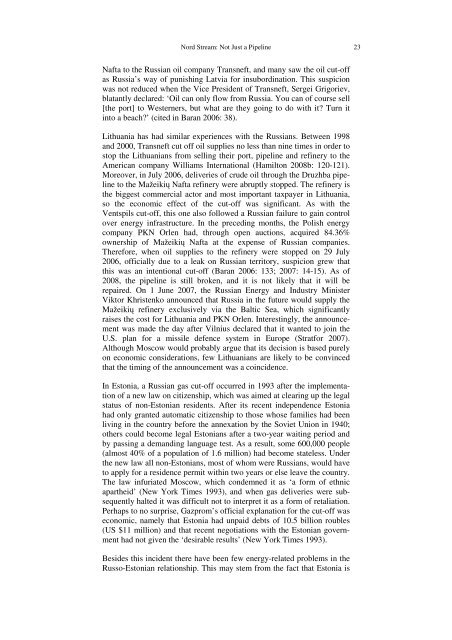Nord Stream: Not Just a Pipeline
Nord Stream: Not Just a Pipeline
Nord Stream: Not Just a Pipeline
Create successful ePaper yourself
Turn your PDF publications into a flip-book with our unique Google optimized e-Paper software.
<strong>Nord</strong> <strong>Stream</strong>: <strong>Not</strong> <strong>Just</strong> a <strong>Pipeline</strong> 23<br />
Nafta to the Russian oil company Transneft, and many saw the oil cut-off<br />
as Russia’s way of punishing Latvia for insubordination. This suspicion<br />
was not reduced when the Vice President of Transneft, Sergei Grigoriev,<br />
blatantly declared: ‘Oil can only flow from Russia. You can of course sell<br />
[the port] to Westerners, but what are they going to do with it? Turn it<br />
into a beach?’ (cited in Baran 2006: 38).<br />
Lithuania has had similar experiences with the Russians. Between 1998<br />
and 2000, Transneft cut off oil supplies no less than nine times in order to<br />
stop the Lithuanians from selling their port, pipeline and refinery to the<br />
American company Williams International (Hamilton 2008b: 120-121).<br />
Moreover, in July 2006, deliveries of crude oil through the Druzhba pipeline<br />
to the Mažeikių Nafta refinery were abruptly stopped. The refinery is<br />
the biggest commercial actor and most important taxpayer in Lithuania,<br />
so the economic effect of the cut-off was significant. As with the<br />
Ventspils cut-off, this one also followed a Russian failure to gain control<br />
over energy infrastructure. In the preceding months, the Polish energy<br />
company PKN Orlen had, through open auctions, acquired 84.36%<br />
ownership of Mažeikių Nafta at the expense of Russian companies.<br />
Therefore, when oil supplies to the refinery were stopped on 29 July<br />
2006, officially due to a leak on Russian territory, suspicion grew that<br />
this was an intentional cut-off (Baran 2006: 133; 2007: 14-15). As of<br />
2008, the pipeline is still broken, and it is not likely that it will be<br />
repaired. On 1 June 2007, the Russian Energy and Industry Minister<br />
Viktor Khristenko announced that Russia in the future would supply the<br />
Mažeikių refinery exclusively via the Baltic Sea, which significantly<br />
raises the cost for Lithuania and PKN Orlen. Interestingly, the announcement<br />
was made the day after Vilnius declared that it wanted to join the<br />
U.S. plan for a missile defence system in Europe (Stratfor 2007).<br />
Although Moscow would probably argue that its decision is based purely<br />
on economic considerations, few Lithuanians are likely to be convinced<br />
that the timing of the announcement was a coincidence.<br />
In Estonia, a Russian gas cut-off occurred in 1993 after the implementation<br />
of a new law on citizenship, which was aimed at clearing up the legal<br />
status of non-Estonian residents. After its recent independence Estonia<br />
had only granted automatic citizenship to those whose families had been<br />
living in the country before the annexation by the Soviet Union in 1940;<br />
others could become legal Estonians after a two-year waiting period and<br />
by passing a demanding language test. As a result, some 600,000 people<br />
(almost 40% of a population of 1.6 million) had become stateless. Under<br />
the new law all non-Estonians, most of whom were Russians, would have<br />
to apply for a residence permit within two years or else leave the country.<br />
The law infuriated Moscow, which condemned it as ‘a form of ethnic<br />
apartheid’ (New York Times 1993), and when gas deliveries were subsequently<br />
halted it was difficult not to interpret it as a form of retaliation.<br />
Perhaps to no surprise, Gazprom’s official explanation for the cut-off was<br />
economic, namely that Estonia had unpaid debts of 10.5 billion roubles<br />
(US $11 million) and that recent negotiations with the Estonian government<br />
had not given the ‘desirable results’ (New York Times 1993).<br />
Besides this incident there have been few energy-related problems in the<br />
Russo-Estonian relationship. This may stem from the fact that Estonia is













